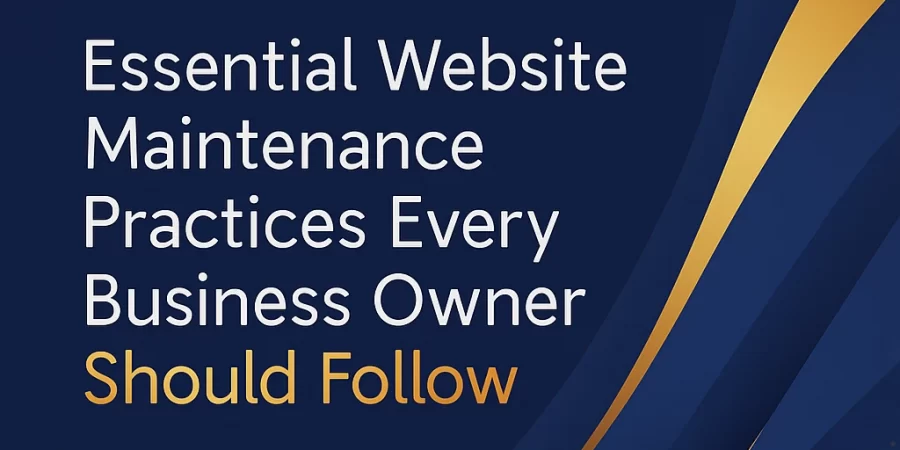Essential Website Maintenance Practices Every Business Owner Should Follow
In today’s digital-first world, your website isn’t just an online business card — it’s your store, your lead generator, and your customer service desk rolled into one. Yet, many business owners overlook the critical routine maintenance required to keep their websites secure, fast, and reliable. From uptime monitoring to vulnerability management, a proactive approach can prevent costly downtime, lost leads, and security breaches.
⏱️ Uptime Monitoring: The First Line of Defense
Uptime monitoring tools act as vigilant sentries for your website. The moment your site goes offline, you receive an instant alert, enabling you to take action before it impacts your customers or SEO. Tools like BetterStack and Uptime Robot offer free plans, perfect for small businesses.
Why it matters:
- Monitors website uptime, SSL certificate validity, and domain expiry.
- Prevents unnoticed SSL expiration or domain lapses that could compromise your business credibility.
- Enables quick response to server or hosting issues before they escalate.
💾 Redundancy in Backups Is Essential for Website Security
Relying solely on your web host’s backup is a gamble you don’t want to take. Server-side failures, hacking incidents, or accidental deletions can lead to irreversible data loss.
Best practice:
Implement at least two backup solutions — one server-side and another off-site using WordPress backup plugins to store copies in Google Drive, Dropbox, or AWS.
It’s simple risk management: Don’t keep all your eggs in one basket.
🔗 Broken Links Harm Both UX and SEO
Broken internal and external links frustrate visitors, damage your site’s credibility, and hurt your search engine rankings. Google actively penalizes websites that deliver a poor user experience.
Maintenance tip:
Use tools like Broken Link Checker or Screaming Frog to regularly scan your site for dead links and fix them promptly. It’s a small task with a big payoff.
🔄 Regular Software Updates Defend Against Hackers
Outdated plugins, themes, and CMS versions are the number one reason websites get hacked. Stay ahead by performing updates weekly.
However, updates carry risks too:
- Always back up your website before applying updates.
- Test updates in a staging environment to catch potential conflicts.
- Review changelogs to gauge the impact of each update.
This disciplined routine ensures your site remains secure and functional.
🛡️ Proactive Vulnerability Checks and Virtual Patching
Plugins and extensions are often the weakest link in your website’s security chain. Services like Patchstack scan your website for vulnerabilities by cross-referencing plugin versions against known threat databases.
When immediate updates aren’t possible, virtual patching steps in.
This acts as a temporary security shield, preventing attackers from exploiting vulnerabilities until a permanent fix is applied.
📝 Regular Form Testing Prevents Missed Leads
Contact forms are vital for capturing leads, bookings, and inquiries — yet they often break without notice due to spam filters, server updates, or email delivery issues.
Proactive approach:
- Manually test forms every few weeks.
- Verify that all confirmation and notification emails are working.
- Don’t rely solely on automated testing tools; human verification is still essential.
Missed form submissions = missed revenue.
👀 Visual Website Checks Catch What Automation Misses
Automated monitoring tools can detect many issues, but they can’t see how your site actually looks and feels to a visitor.
Maintenance must-do:
- Perform visual inspections in incognito mode across different devices and browsers.
- Check for layout shifts, display errors, or broken features, especially after updates.
First impressions count — keep your site polished and professional.
Conclusion
Website maintenance isn’t a one-time task — it’s an ongoing commitment to safeguarding your online investment. By following these practical, actionable strategies:
- Uptime monitoring
- Redundant backups
- Broken link scans
- Regular updates
- Vulnerability management
- Form testing
- Visual inspections
…you’ll protect your business, provide a seamless experience for your visitors, and secure your place in search engine rankings.
For business owners looking to delegate website care, partnering with the best website development company in Kochi ensures expert handling of these critical maintenance tasks, giving you more time to focus on growing your brand.
Whether managing your website in-house or collaborating with experienced professionals like the best website maintenance company in Kochi, proactive maintenance is non-negotiable for long-term digital success.


